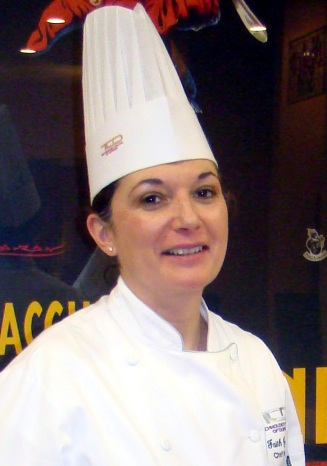Create a Culture
In order to build a culinary team, the first step is to create a supportive culture in the school building. Competitions are a team effort, so gather interested teachers, coaches, business partners, administration and, most importantly, students to create your mission or goal and then live it! TCD’s team mission is to represent TCD as highly organized and well-prepared student culinary competitors. Chef Matthew Barker, the culinary team’s coach, believes that culinary competitions can change people’s lives. “I have seen that in my own life and in the lives of my students,” he says. “The opportunities to learn and network are the ‘win’ in competitions.”
Secure Needed Resources
An important step in planning is to identify the resources the team will need to be successful. Support includes financial, technical, physical and emotional resources. Do you need to include cost in your school budget, create fund-raisers or enlist business-partner donations? Do you have the physical space for the team to practice or do you need to find an alternate site, i.e., other culinary schools or industry-partner kitchens? Does your staff have the expert technical skills required to train a team? If not, send staff members out for training or resource the talents of other chef experts in the area. Developing a successful culinary competition takes a great deal of time and commitment, so make sure that school admistrators, parents and family members believe and support your ventures. Communicate to them early and often the goals and progress of the team, and encourage them to be a part of the experience.
Get Organized
To organize your team, start by qualifying team members through establishing team standards, holding tryouts, clarifying expectations and writing student/coach/parent accountability contracts. These contracts should be written by students under the guidance of their coaches. They should include professional behavior, attendance and performance clauses. In this step of the process, it is a great idea to start building a resource binder that includes calendars, contact information, student contracts, competition guidelines/correspondence, travel documents and training materials.
Practice! Record! Analyze! Debrief! Record! Repeat!
After you have set your goals, planned your journey and organized, it is finally time to practice. Establish a who-when-and-where schedule. This is where the real value of competition is. TCD’s Chef Jennifer Candir says, “Being engaged in a group culinary competition helps to cultivate transferrable life skills such as communication, professionalism and a sense of urgency. Everyone is required to step up and give their best.” Practice time is crucial to success and should be considered priceless. It is invaluable to train students to utilize station set-up diagrams, standardized recipes and equipment and product lists. Don’t forget the most important part of the training process—helping students to develop their critical-thinking and problem-solving skills. As a coach, step back and allow the students to be the first ones to critique and taste their food. Then, guide them through to the gold standard. Encourage industry experts to attend your practices. Make sure that you record ideas for improvement and implement them at the next session.
Enjoy the Game
Joseph Wegner, a recent TCD culinary-team member, declares that his experience on the team as “unbeatable, an amazing networking opportunity.” Wegner says, “I gained knowledge in multiple fields, got ready for college and built lifelong relationships.” Isn’t this a game that you want your students and staff to play, too?
Faith Jennetta, CEPC, is the program coordinator and baking instructor at Technology Center of DuPage in Addison, Ill. The culinary-arts program at this secondary career and education facility received the 2010 CAFÉ/Kendall College Green Award.
 Don’t forget the most important part of the training process—helping students develop their critical-thinking and problem-solving skills.
Don’t forget the most important part of the training process—helping students develop their critical-thinking and problem-solving skills.